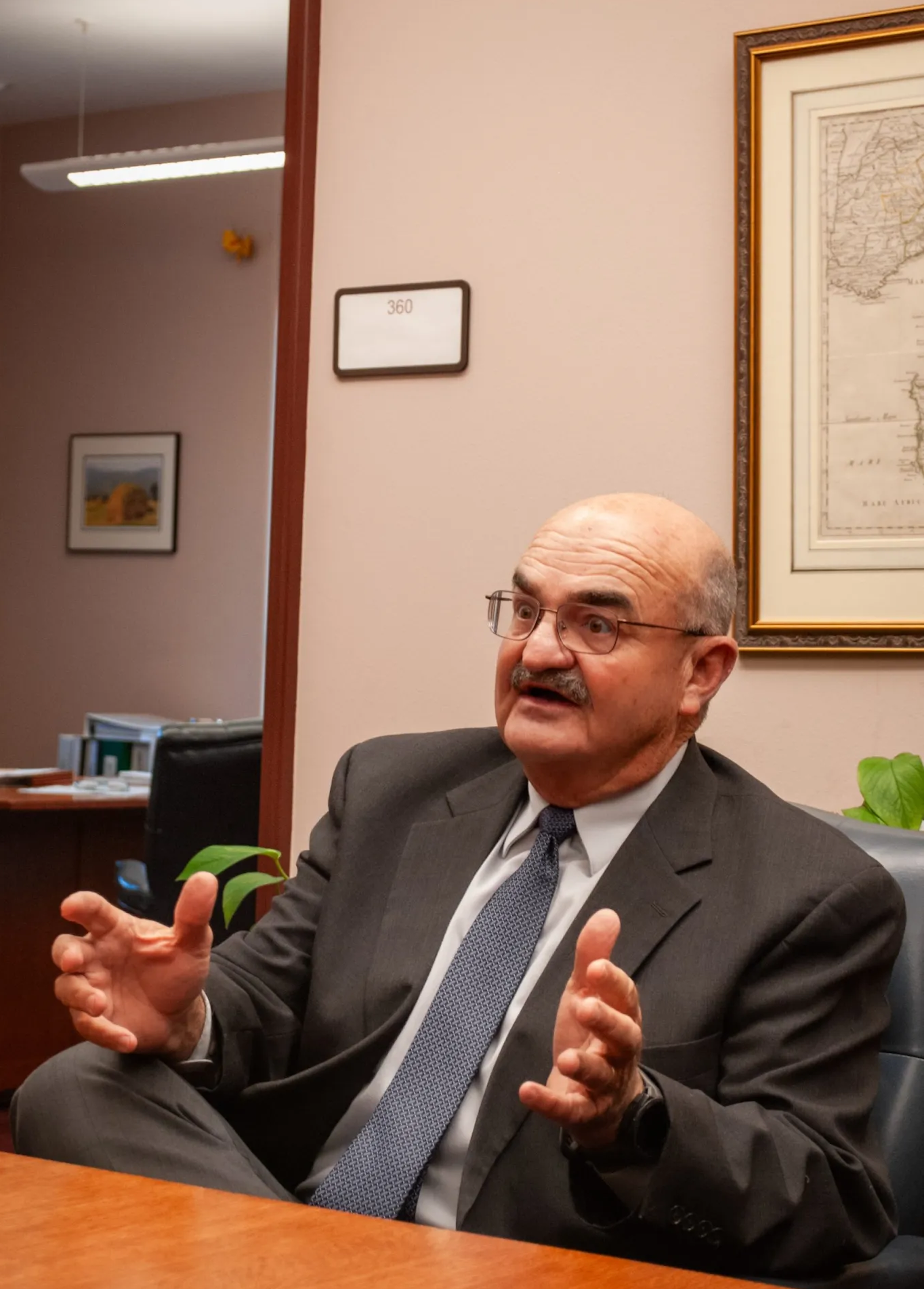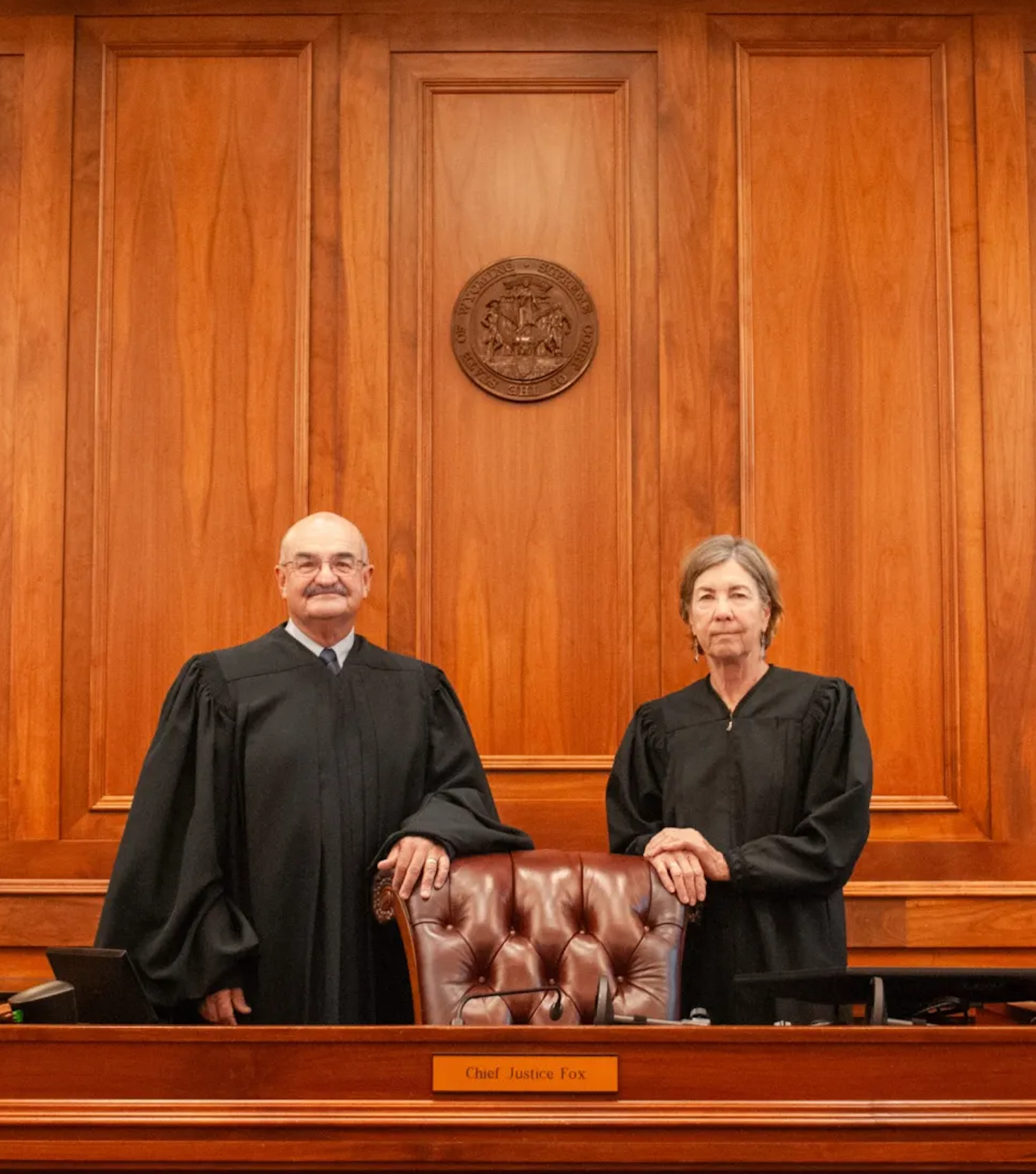
• After 30 years as a judge, Justice Keith Kautz must retire because of Wyoming’s age laws. The governor, a defendant in a major abortion ban suit, will appoint a replacement.
By Madelyn Beck, WyoFile.com
Wyoming Supreme Court Justice Keith Kautz will retire in March, but not because he wants to.
“I’m not tired, I’m not burned out, I don’t feel like I’m not useful,” he told WyoFile during an interview at the supreme court building in Cheyenne. “In fact, I feel the opposite.”
At 70, Wyoming Supreme Court and district court judges are required to retire. Many have questioned the ethics and practicality of the age ceiling, but an effort to increase it to 75 failed at the ballot box last year.
Kautz believes there will be smart younger people to take his place and that he’ll find new opportunities, but he laments lost talents like judges Timothy Day, Michael Davis and Ed Grant, who died in 2020 after retiring from the bench a decade before.
Still, Kautz said, “when I signed up for the job, the age [to retire] was 70. And so I’m not sour grapes.”
Kautz is leaving as a major case involving Wyoming’s two abortion bans is expected to come before the justices. Gov. Mark Gordon — a defendant in that case — will choose Kautz’s replacement.
Both he and Chief Justice Kate Fox said they have faith in Wyoming’s judicial system and residents’ respect for the court, but Kautz acknowledged the job occasionally comes with public disapproval.
Kautz ascendence
Kautz grew up on a farm near Huntley, Wyoming, and Lyman, Nebraska. He later applied his early lessons in the importance of work to the courtroom, he once told the Star Herald.
After graduating from Torrington High School, Kautz attended the University of Wyoming, where he got a bachelor’s of science in 1975, followed by a law degree in 1978. Not too long after, he joined a law firm in Torrington where he worked until 1993, when Gov. Mike Sullivan appointed him to become a district court judge.
Kautz was a finalist for a seat on the state’s highest court in 2012 and earned Gov. Matt Mead’s appointment in 2015. In all, Kautz has been active in Wyoming’s legal scene for nearly 45 years.
When Mead appointed Kautz, he said the judge’s “experience in private practice and his exemplary work on the bench for more than two decades gives me confidence that he will serve Wyoming and its citizens well on the Supreme Court.”
While he feasibly could make more money in private practice, Kautz said he loves being a judge. And serving on the Supreme Court is even better than hearing cases at the district level.
“As a trial judge, you do that by yourself. Scary. Here, it’s wonderful. I have four colleagues that are all smarter than me, and we have great conversations,” he said. “So that helps remove some of the stress. I also don’t see any personal antagonism here.”
The admiration between Kautz and Fox was palpable as they sat next to each other for the interview. They might not have always agreed — and frequently didn’t — but Fox said working with him made her a better justice.
“It’s been hard, but hard in a great way,” she said of working with Kautz. “Because he and I have challenged each other and grown and been better because of it. And I’m gonna get a little sentimental.”
He felt the same.
“Sometimes you have colleagues that push you and challenge you,” he said. “It’s almost like they’re the devil’s advocate, but it’s that they’re doing good work. And they’re making you rise to their level.”
He said Fox was that for him, “and I need that. And I think it’s made me significantly better, working with her. I think we would have been good partners all along.”
While they acknowledge differing approaches and philosophies, the two said they have a common passion for the rule of law and enjoy working through the process with each other.
After a momentary pause, Kautz told Fox “Thank you.”
“Thank you,” Fox said back, with a few tears in the corner of her eyes.
Judicial scrutiny
Judges must possess thick skin, Kautz said. He recalled a time when he entered a barber shop while serving as a district court judge in Torrington. One of the men there was angry over a recent decision.
“And I got an earful,” he said. “In a democracy, people get to do that, even if they’re uninformed. And so I guess there are two ways to respond.”
One is to yell back, namecall or even call the sheriff to hold him in contempt, Kautz said. The other, which he chose, was to explain his approach and guarantee that he did his best with the evidence presented.
“That wasn’t satisfactory to him, but that’s just the way it goes,” he said.
Kautz believes strongly in people’s ability to utilize free speech, but laments some of the divisive rhetoric in today’s “wave” of politics, going far beyond the judiciary.
“It’s unfortunate,” he said. “I don’t think that’s productive. But I’m not willing, in a democracy, to say ‘You can’t have the rhetoric.’ So, it’s kind of looking at this from the big picture, not just inside the judiciary, but what do we do?”
Fox added that she hopes people can have a little grace for judges, who’re people with hard jobs. And about attorneys, she added, “they’re officers of the court, they’re people who’ve also sworn an oath to uphold the rule of law. And so of attorneys, I would expect a little more respect for the judiciary.”
Recently, Wyoming attorney Cassie Craven appeared on Fox News to say U.S. District Judge Alan Johnson’s recent ruling made her case regarding a sorority into “a political issue.” Four other attorneys disputed her claim, backing the judge’s opinion that the court didn’t have a role to play in this instance.
The Wyoming Freedom Caucus, meanwhile, called Judge Melissa Owens of Teton County an “activist” after she temporarily blocked a sweeping abortion ban from taking effect.
In other states, animus toward judges has extended beyond rhetoric. After a Maryland judge was murdered, Fox released a statement that said the justices “appreciate the respect” Wyomingites have for the judiciary, but acknowledged that judges here and throughout the U.S. have received increasing threats of violence in recent years.
“Judges call balls and strikes, and they perform many services for the people of Wyoming; they should never be the target of people’s dissatisfaction with the outcome of a case,” Fox stated.
Recent efforts to create a law prohibiting intimidation of judges failed to pass the Joint Judiciary Committee.
Members of the U.S. Supreme Court have also come under intense scrutiny over gifts given to justices — something largely prohibited by Wyoming’s own judicial conduct code. The national court recently passed its own ethics rules.

What’s next
Kautz will be leaving on March 26, according to the court.
Already, his job is posted online, and members of the state bar have been alerted to it. Candidates have until 5 p.m. on Nov. 20 to apply for the $187,000-a-year position.
The state’s Judicial Nominating Commission will vet candidates first, giving Gov. Mark Gordon a choice among the top three. It’s a system that Kautz considers far better than in other states, which can involve costly elections. He recalled a friend in Texas who had to spend around $170,000 on an election as a district court judge.
“I about fell out of my chair. And so I said, ‘Where do you get that kind of money? You have to be rich to be on the judiciary?” he asked. “And she said, ‘No, I solicit funds from the lawyers.’”
Spending in a Wisconsin Supreme Court election broke national records last spring, topping $42 million.
Wyoming’s Judicial Nominating Commission includes Fox as chair, three lawyers elected by the Wyoming State Bar — Katherine Strike of Lander, Devon O’Connell of Laramie and Mandy Good of Cheyenne — and three gubernatorial appointees — Paul Scherbel of Afton, former lawmaker Dan Kirkbride of Chugwater and Lisa Anderson of Shell.
The governor will have the final say. Meanwhile, Gordon, as the state’s chief executive, is a defendant in the case over Wyoming’s abortion bans, which is expected to end up before the state supreme court.
Gordon signed a medication abortion ban into law March 17 and allowed another near-total ban to go into effect without his signature. Both are on hold while the civil case against them proceeds.
Gordon’s office did not respond to a request for comment about his upcoming judicial selection.
While Kautz and Fox trust the process to appoint a qualified judge, they said, there may be situations — though unlikely — where the new justice should consider recusal from an upcoming case involving the state and the governor.
“The answer is a typical lawyer answer,” Fox added. “It depends.”
The bigger picture
Kautz isn’t the only justice who will be departing the court in the near future. Fox is slated to be forced into retirement in 2025, after a retention election in 2024. She’s not “too broken up about it,” she said, but still feels the age limit is low.
“I like a mandatory retirement age because I don’t think we should be still hanging on when they’re having to roll us to the bench when we’re 90,” she said. “But I think 70 is young. I think we still have a lot to offer.”
For those looking to join the Wyoming Supreme Court in the future, Kautz advises that they don’t get too cynical.
“Don’t get jaded, don’t think about all this bad stuff,” he said, referring to the rhetoric and polarized politics of today. “Because the law is really good.”
Kautz’s father-in-law and grandfather-in-law were both judges. While he never met the latter, he said he had great respect for and learned a lot from both. He hopes judicial hopefuls can find other judges to look up to, too.
“I hope I live up a little bit to what they left,” Kautz said of the two. “I learned a lot from all of those … judges that I grew up practicing with. Every day I went to court, I learned how to treat people.”
New justices have a “retainer election” two years after being appointed, and then every eight years after that. Kautz says not to worry too much about them — even if it can be scary the first time. Justices with upcoming elections in 2024 include Fox and John Fenn.
“You just can’t worry about it,” he said, noting that it’s a group effort of five legal minds trying to get it right. “We’re not political animals.”
Fox added that the justices’ opinions carry weight, and while it can even be fun to research and write and discuss, their work lives on long past their tenure.
Adequate support for a busy court system is a concern, though, Fox said.
“We need many more resources,” she said. “The nature of the work that the judiciary does has changed over time. It’s more complicated by things like the increased prevalence of mental illness and substance abuse [and] more self-represented litigants because they can’t afford lawyers.”
Fox said the courts would rather not be in the business of mental health, but that’s where the issue is showing up. There’s work being done on a mental health diversion pilot program in Campbell County, she said, and on a court navigator program to help people representing themselves. But these new kinds of programs “require more administrative work, more personnel, more money from the Legislature,” she said.
Even with the challenges of a modern court system, though, both Kautz and Fox say being a justice is a great job.
“It’s the best thing,” Kautz said. “Every stage of my career has been the best thing. I got to try a lot of cases as a lawyer, then I went [on] to see lawyers do that. And now I get to see how it turns out in the back end and think about the law and how that applies. Ah, I’m the luckiest guy.”
Kautz isn’t sure what all he’ll do in his retirement, but he’s working on a bucket list, planning for some down time and has at least one short-term plan with his wife.
“In March, after I leave, we’re going to go with our camper and visit some national parks and have a little fun,” he said.
Finally, when asked whether he has any favorite judge or lawyer jokes after so many years within the legal system, Kautz didn’t miss a beat.
There was once a wonderful labrador retriever hunting dog named Lawyer, he recounted. The owner would take all kinds of guests out hunting, and the pup could retrieve anything.
“He’d shoot a duck out 300 yards, and Lawyer would go get him and it was just wonderful,” Kautz said.
The next hunting season, a familiar friend came hunting with the owner. As a flock flew by, the two stood up and shot some of the ducks, but the dog just barked and barked, not retrieving. The friend asked what happened to the dog.
“And he goes ‘Oh, it’s terrible. You know, his name is Lawyer, and one day somebody got confused and calls him Judge, and now all he does is sit on his butt and bark,” Kautz said, smiling under his thick mustache.





